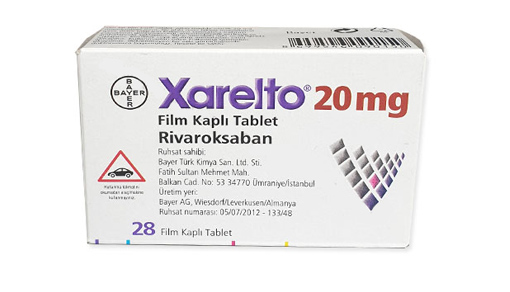How Often Should You Get Check-Ups While Taking Rivaroxaban (Xarelto) 20mg? A Patient's Guide

How Often Should You Get Check-Ups While Taking Rivaroxaban (Xarelto) 20mg? A Patient's Guide
For patients prescribed Rivaroxaban (Xarelto, 利伐沙班) 20mg—a common anticoagulant for preventing and treating blood clots—a key question arises:
"How frequently do I need medical check-ups?"
Unlike older blood thinners (e.g., warfarin), Rivaroxaban requires less frequent monitoring, but regular follow-ups remain crucial for safety. Here’s what you need to know.
1. What Is Rivaroxaban (Xarelto)?
Rivaroxaban is a direct Factor Xa inhibitor that:
Prevents deep vein thrombosis (DVT) and pulmonary embolism (PE)
Reduces stroke risk in atrial fibrillation
Requires no routine INR tests (unlike warfarin)
Standard Dosage:
DVT/PE treatment: 15mg twice daily for 21 days → then 20mg once daily
Long-term prevention: 20mg once daily
2. Why Are Check-Ups Important?
While Rivaroxaban doesn’t need frequent blood tests, follow-ups help:
✔ Monitor for bleeding risks (e.g., unusual bruising, blood in stool)
✔ Assess kidney/liver function (critical for drug metabolism)
✔ Adjust treatment if new medications are added
3. Recommended Check-Up Schedule
First Follow-Up: 1 Month After Starting
Purpose:
Confirm the drug is working (no new clots)
Check for side effects (e.g., anemia, abnormal bleeding)
Tests your doctor may order:
Kidney function tests (creatinine levels)
Liver enzymes (ALT/AST)
Hemoglobin (for anemia screening)
Subsequent Visits: Every 3–6 Months
Stable patients: May extend to 6-month intervals
High-risk patients (e.g., elderly, kidney impairment): Every 3 months
Emergency Visits If:
Severe bleeding (nosebleeds that won’t stop, black stools)
Symptoms of clots (sudden leg swelling, chest pain)
4. Cost and Accessibility
Brand-name Xarelto: ~¥500–¥800/box (varies by region)
Generic Rivaroxaban: ~¥300–¥500/box (check for quality certification)
Insurance coverage: Often reimbursed for approved indications
5. Key Precautions
Avoid NSAIDs (e.g., ibuprofen)—increase bleeding risk.
Inform dentists/surgeons before procedures (may need to pause medication).
Watch for interactions with antibiotics (e.g., clarithromycin) or antifungals.
Q&A: Patient Concerns Addressed
Q1: Can I skip check-ups if I feel fine?
A: No—some risks (e.g., silent kidney issues) only show up in tests.
Q2: Do I need INR tests like with warfarin?
A: No, but kidney/liver tests are still important.
Q3: What if I miss a dose?
A: Take it as soon as you remember, but never double the dose.
Q4: Are there natural blood thinners to avoid?
A: Yes—ginger, ginkgo, and high-dose vitamin E may increase bleeding risk.
Conclusion
While Rivaroxaban simplifies anticoagulation therapy, regular check-ups ensure safety and efficacy. Work with your doctor to tailor a monitoring plan.
[For personalized advice, consult Dingxiang Customer Service.]

